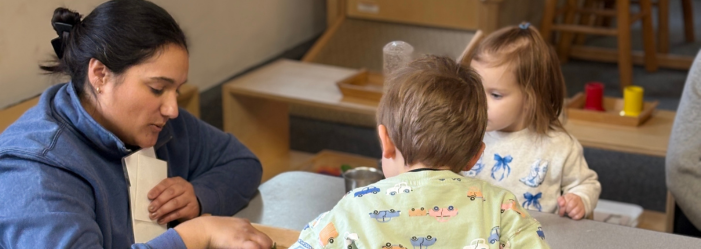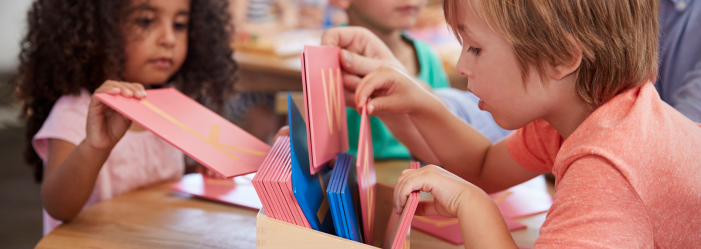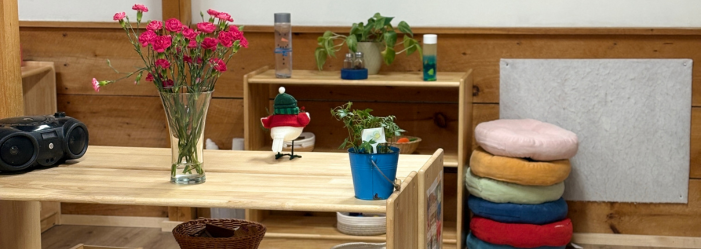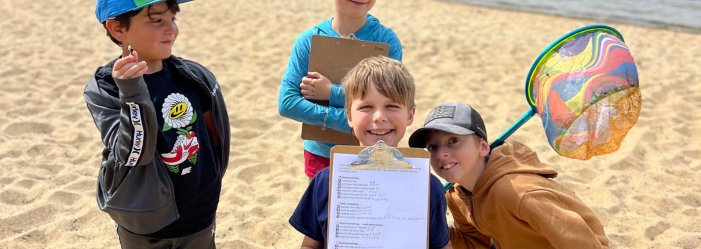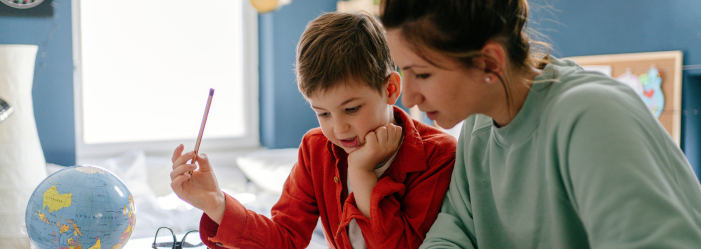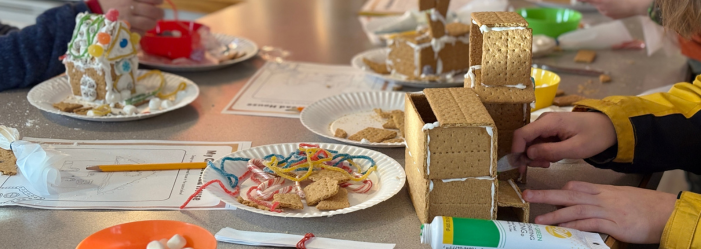An Example Montessori Daily Schedule: Inside a Week of Learning, Leadership, and Discovery for Elementary Students
An Example Montessori Daily Schedule: Inside a Week of Learning, Leadership, and Discovery for Elementary Students
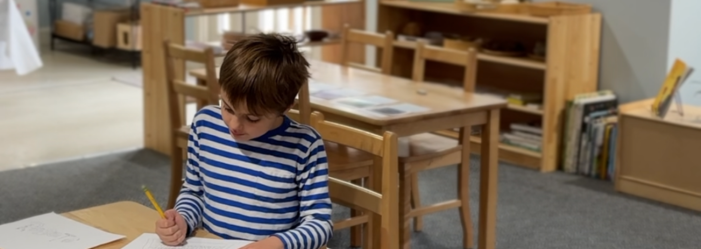
Parents often ask, “What does a typical day look like in a Montessori classroom?”
The short answer: it’s anything but typical. While
Montessori days are structured differently from those in traditional schools, they’re full of purpose, flow, and calm energy.
Each day is intentionally designed to help children develop independence, curiosity, and confidence through meaningful work and genuine community connection. In this example Montessori daily schedule, you’ll see how focus, creativity, and joy come together to form a week filled with learning, leadership, and discovery.
The Montessori Difference: Structure that Feels Like Freedom
Montessori classrooms follow a predictable structure, not a rigid timetable. The goal isn’t to control every minute; it’s to cultivate flow.
When children have uninterrupted time to think, explore, and collaborate, they begin to manage their own learning. This is what Dr. Maria Montessori called
“freedom within limits.”
Each morning, students move through a 2½–3-hour work cycle that allows concentration to take root. During that time, a student might explore geometry with the pegboard, write a creative story, conduct a science experiment, or work alongside a friend to research ancient civilizations.
“The greatest gifts we can give children are the roots of responsibility and the wings of independence.” – Dr. Maria Montessori
Our teachers guide, but do not direct. They give lessons in small groups or one-on-one, offering just enough structure to keep momentum while honoring each child’s individual pace. Each child is trusted to take ownership of their time, and that trust is what cultivates confidence.
Morning Routine and Work Cycle
8:15-8:30 a.m. - Arrival & Community Connection
Children enter calm, intentional spaces, they might see fresh flowers on tables, hear soft music in the background, and see shelves arranged for discovery. Students unpack independently, greet friends and teachers, and begin journaling right away, setting the tone for a grounded, purposeful day.
This morning connection is a small, and powerful ritual. It’s a daily reminder that school is
their space, a place where they belong, contribute, and are known.
8:30-11:30 a.m. - The Morning Work Cycle
During the work cycle, students use journals or work plans to set goals for the day. Teachers offer new lessons in math, language, history, and science while also giving space for practice and mastery.
Older students often mentor younger ones, modeling kindness and leadership. You might see a fourth grader guiding a first grader through long division or sharing tips on how to edit a story draft. These interactions are intentional, children learn empathy, communication, and collaboration through experience, not instruction.
Freedom within limits keeps focus and flow: students choose their work, but within boundaries that encourage completion, care for materials, and respect for others’ concentration.
11:30 a.m. - 12:00 p.m. - Outdoor Recess & Nature Time
After deep concentration comes movement and connection with nature. The outdoors at SMS is viewed as an extension of the classroom, a living environment where lessons naturally continue.
Children climb, dig, explore, and play games that develop coordination and social skills. Teachers might see a spontaneous botany lesson unfold as students collect leaves or measure shadows with rulers, proof that curiosity doesn’t stop at the classroom door.
Midday - Lunch and Social Connection
12:00-12:45 p.m. - Lunch & Conversation
Meals in Montessori are lessons in grace and courtesy. Students set tables, pour their own water, and share quiet conversation. They practice patience, take turns speaking, and learn to be mindful of others.
These small rituals build community and lunch becomes more than nourishment . . . it’s a shared act of belonging, a time to slow down and enjoy connection after a productive morning of work.
12:45-1:15 p.m. - Clean-Up & Transition
Responsibility is built into every routine. Children clear their plates, sweep crumbs, and tidy their workspaces. The environment is cared for collectively, teaching that contribution is a natural and joyful part of community life.
Afternoons Filled with Enrichment and Exploration
Afternoons at Sandwich Montessori School expand learning beyond core academics. Enrichment programs nurture creativity, problem-solving, and teamwork, the essential skills for lifelong learning.
Students enroll in enrichment classes on a full-year or trimester basis, allowing for continuity, depth, and meaningful relationships within each experience. These programs are also a wonderful way for
local homeschooling families to design a Montessori-inspired learning path tailored to their children’s interests, while connecting with a vibrant community of peers.
Monday - Spanish Lab & Chess
In Spanish Lab, students learn through conversation, songs, and hands-on projects that connect language to culture.
Chess builds patience and strategic thinking, helping children plan several steps ahead, just as they do when approaching complex lessons.
Tuesday - Music
Through melody, rhythm, and song, children develop emotional expression, listening skills, and confidence. Music allows children to explore creativity while strengthening focus and coordination, a powerful combination that enriches every other subject they study.
Wednesday - Clay & Art History
Students learn about history through the study of clay and art, creating inspired works with paint, sculpture, and natural materials. Clay, in particular, allows children to experience transformation and internalize how raw materials can become something beautiful through persistence and imagination.
“Imagination does not become great until human beings, given the courage and the strength, use it to create.” – Maria Montessori
Thursday - Backyard Barnyard & STEM Lab
In the Backyard Barnyard, students garden, learn about animals, and study ecosystems firsthand. They observe, record, and connect with the living world around them, developing both responsibility and wonder.
STEM Lab invites them to experiment, build, and innovate. Students might design a simple machine from recycled materials or testing the pH of soil from the garden. Learning becomes active, tangible, and deeply connected to curiosity.
Friday - Civics, Leadership, and Dungeons & Dragons
Fridays bring reflection, collaboration, and imagination together. In Civics and Leadership, students learn how communities function and what it means to lead with integrity. They discuss real-world examples, explore current events, and take on small leadership roles within the school community, learning that leadership is about service, not authority.
In
Dungeons & Dragons, children step into worlds of their own creation. They practice storytelling, empathy, and math while collaborating with peers. Each campaign strengthens communication, creativity, and patience.
The week closes with reflection meetings, where students share accomplishments, express gratitude, and celebrate one another’s growth.
The Balance of Work, Play, and Purpose
A Montessori schedule is more than a set of activities, it’s a living flow that balances focus with joy.
Children experience:
- Focus through long, uninterrupted work periods
- Community through shared meals and group projects
- Confidence through leadership and real responsibility
As students learn to manage time, follow curiosity, and care for their environment, they develop the habits of independence that serve them throughout life.
Why the Montessori Daily Schedule Works
The flow of a Montessori day mirrors the pattern of life: periods of concentration, rest, and contribution. Predictability offers security; freedom keeps learning joyful.
Elementary children thrive because they:
- Move with purpose
- Work deeply
- Collaborate naturally
- See learning as exciting, not something to “get through”
When the day ends, they feel genuine pride, not from external rewards, but from meaningful accomplishment. They’ve learned to connect effort with purpose and joy with contribution.
Bringing Montessori Structure Home
Parents often tell us they’d love to bring the same sense of calm and independence home. A few simple ideas can help:
- Create consistent morning and evening routines
- Offer choices within limits (“Would you like to start with reading or drawing today?”)
- Set aside focused, screen-free time for creative work or deep play
- Encourage children to plan their own day with simple visual checklists
Remember: it’s about balance, not perfection. The goal is a home life that mirrors the respect and structure your child experiences at school..
A Week of Independence and Joy
A Montessori day isn’t a checklist, it’s a cycle of learning and living. Each moment, from morning work to Friday reflection, nurtures the child’s growing sense of purpose and belonging.
At
Sandwich Montessori School, we help children develop independence and responsibility, one moment at a time. Every routine is an opportunity for growth, every transition a lesson in grace, and every enrichment class a door to discovery.
Learn more about our Elementary and Middle School Programs →
Here
Visit our Blog Page →
Here

